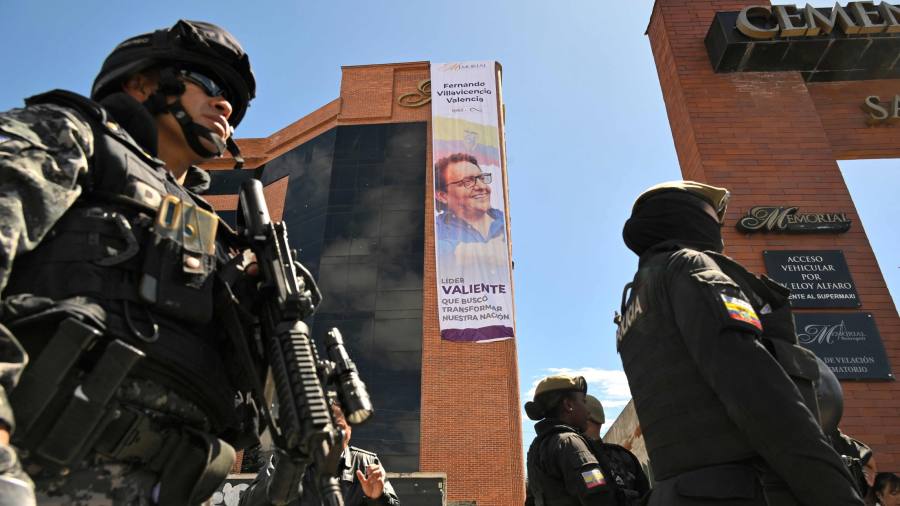The fatal shooting of an Ecuadorean presidential candidate at a rally has plunged the country deeper into a political and security crisis, ensuring this month’s election will be shaped by a killing unprecedented in the nation’s modern history.
In the wake of the murder of Fernando Villavicencio, headlines around the world drew attention to a mode of political violence reminiscent of Colombia in the 1980s, confirming the loss of Ecuador’s reputation as a peaceful oasis on a violent continent.
“We’re living through what Colombians lived through in the 80s with Pablo Escobar,” said Angel Merchano, a security guard in Quito. “The police and the army need to be better armed. They are outgunned by drug traffickers.”
Villavicencio’s murder came after he campaigned on an anti-corruption platform, and as the Andean country contends with a steep rise in drug-fuelled violence that began with massacres in the country’s overcrowded prison system before spreading to the streets.
At the rally preceding his death, Villavicencio had pledged to write “the history of the fight against corruption and the mafia” and said: “Here nothing is free. This democracy has cost us our lives. Defending the homeland has cost us our lives.”
Some 3,500 people have been killed so far this year, according to the police. Last year, 4,800 homicides were reported in the nation of 18mn, almost double the rate the year before and quadruple that of 2018, according to the interior ministry.
Last month another public figure, the mayor of the port city of Manta, was gunned down at a public event.
In Quito, the highland capital, shops that once stayed open late are now shuttered at nightfall. On Thursday, while some attended vigils in honour of Villavicencio, many residents stayed home, leaving streets deserted.
“If presidential candidates are in danger, then what about everyone else?” said Andrés Villamarin, a student from a suburb north of the capital. “We are left to fend for ourselves.”
Eva Gordón, a homemaker in the capital, said that the violence “affects everyone, directly or indirectly” but that many Ecuadoreans have little faith that any presidential candidate could stem the chaos.
Gordón herself is unsure who to vote for. “Unfortunately, we can’t trust in any politician because they have only disappointed us . . . Meanwhile, criminals have the whole country cowering in fear as they take over,” she said.
Police have arrested six suspects over Villavicencio’s murder, while another was killed in a shootout. All are Colombian, police said on Thursday, while the government said it would go after the “intellectual authors” of the assassination. US FBI agents are travelling to Ecuador to help the investigation.
Nine people were injured in the attack that killed Villavicencio, including a candidate for the national assembly and two police officers.
Elections for the country’s president and congress are due to take place on August 20, with electoral authorities saying the timetable is “unalterable” following rumours that the polls would need to be postponed. If no candidate for president wins more than 50 per cent of the vote, a run-off will take place on October 15.
Sofía Cordero, a Quito-based political scientist at the Observatory for Political Reforms in Latin America, said that “there are no guarantees” for the safety of candidates or voters in Ecuador.
“People will be risking their lives to vote, and the government has shown it is not capable of providing security during these elections,” she said.
The snap election was triggered by outgoing president Guillermo Lasso, who in May dissolved congress using a constitutional clause known as “mutual death”.
Lasso had been battling impeachment charges by the opposition-controlled legislature at the time, relating to contracts awarded to state-owned oil transport company Flopec before he took office. Lasso is not contesting the poll.
The nation’s security crisis was already set to dominate the election, with polls repeatedly finding it to be voters’ primary concern.
Drug traffickers have increasingly sought to consolidate power in Ecuador, with port cities, where security is relatively lax, suffering the most extreme violence. Compared with neighbouring Colombia and Peru — both big cocaine producers — Ecuador’s military and police are less equipped to deal with violent gangs, analysts say.
Villavicencio, a former lawmaker and journalist, said in an interview with the Financial Times in May that he would “declare a war on criminal economies”.
“The war would combine a head-on fight in the streets, controlling the prisons, and isolating all the bosses of drug-trafficking groups,” he said. During the campaign, he said he had been threatened by drug-trafficking groups including the powerful Choneros gang.
Villavicencio, who is survived by his wife and two children, built his reputation as a journalist with investigations into Rafael Correa, the leftist former president now exiled in Belgium to avoid arrest after being convicted on corruption charges in Ecuador relating to his 2007-17 presidency.
Correa’s handpicked candidate, Luisa González, is viewed as the frontrunner in this month’s election, though polls show her performing well below the threshold needed to avoid a run-off.
“The parallel question is whether Villavicencio’s killing deflates Correismo given that the late candidate was such a caustic critic of Correa,” said Nicholas Watson, managing director of Teneo, a political consultancy.
Mercedes Torres, a shopkeeper in Quito, said that Villavicencio’s murder marked a victory for “impunity and corruption”. “As a shopkeeper and citizen, I’m thinking the best thing to do is leave the country,” she said.
Read the full article here




